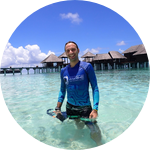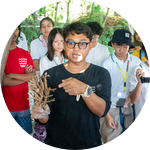Project Results
We are very pleased to announce that we have finished the Automatic AI-Based Categorisation of Biotic Components in Natural and Restored Coral Reefs and the Underwater Live Camera installation in Lombok.
This study demonstrates that AI-based image analysis can significantly enhance coral reef monitoring, particularly for natural quadrat-based assessments. While performance in artificial structures remains limited, these challenges can be addressed through improved training data and structural standardisation.
Additionally, the live underwater camera has captured a broad range of marine life, providing valuable insights into local biodiversity. These sightings reflect a healthy and active reef ecosystem, with a mix of resident and transient species frequenting the area. The data also supports the continued relevance of Nipah Beach as a critical habitat within the West Lombok marine landscape.
About This Project
We hypothesize that near real-time monitoring using PTZ CCTV cameras and the YOLOv10 AI algorithm can effectively monitor coral reef restoration, reduce fieldwork, and enable rapid response to disturbances. Our primary focus is to determine if this technology can accurately assess reef health and growth and provide early warnings to stakeholders. We will also evaluate the effectiveness of UV light in monitoring coral spawning and the ability of AI models to track fish and classify coral cover.
Ask the Scientists
Join The DiscussionWhat is the context of this research?
This research focuses on a coral reef of significant ecological importance in West Lombok, particularly in the Coral Triangle region. We chose this reef because it represents a typical restoration site facing threats such as bleaching and storm damage. The monitoring methods, including live underwater cameras and the YOLOv10 algorithm, were chosen for their ability to provide accurate, real-time data while minimizing resource-intensive fieldwork. This area is critical as a habitat for marine species and supports the local economy through tourism and fishing. Previous studies by NGOs have highlighted the critical state of the reef and the urgent need for innovative restoration and monitoring techniques.
What is the significance of this project?
Our innovation addresses effective coral reef monitoring by providing continuous, real-time data, eliminating traditional, labor-intensive methods that cause delayed responses to disturbances. Using PTZ CCTV cameras with self-cleaning underwater housings ensures uninterrupted monitoring. Solar-powered systems enhance sustainability, while UV lights and data logger buoys enable night-time observations and record key parameters like pH, dissolved oxygen, temperature, and salinity 24/7. Stakeholders, including policymakers and conservationists, can access this live stream, enhancing coral reef restoration assessment and monitoring.
What are the goals of the project?
Our project aims to develop a machine learning model to monitor coral reefs and deploy live underwater cameras to obtain real-time footage from two separate reefs. The machine learning model, using YOLOv10, will classify coral from photogrammetric data. The PTZ CCTV cameras, equipped with self-cleaning housings and UV lights for nighttime monitoring, will provide continuous, high-quality footage. Solar power and data logger buoys will ensure sustainable operation by recording vital parameters such as pH, dissolved oxygen, temperature and salinity. This setup will allow stakeholders, including policymakers and conservationists, to access live data for timely intervention and better decision-making, increasing the efficiency and effectiveness of coral reef restoration efforts.
Budget
The budget will all proceed towards equipment, tools/technology, human resources and logistics needed to execute the project.
At the moment we have two main coral reef restoration projects which are supported by a mix of source of funding such as private donors, companies and other NGOs. However, we plan to make our long-term monitoring process more effective and efficient by applying the planned technology on-site.
About 50% of the funding will go to the ten marine biologists who will annotate in total of 20,000 images from two sites (10,000 each) with high-quality identification ability hence a better model. In addition, we need to employ a computer programmer who can implement the annotated images into the coding and make the model ready to use and publish.
Endorsed by
 Project Timeline
Project Timeline
Over the course of six months, we will install an underwater camera system, capture 20,000 reef images, annotate these images, and train and fine-tune a machine learning model for reef site classification and segmentation analysis. This comprehensive plan will ensure that the project achieves its goals within the specified timeframe.
Aug 26, 2024
Project Launched
Mar 01, 2025
Take 20,000 images in two reefs and develop the SOP for data collection and image annotation.
Mar 15, 2025
Begin annotating images. This process will take approximately two months. During this time, we will conduct regular annotation quality checks.
Mar 15, 2025
Train 10 junior marine biologists to accurately annotate the dataset.
Apr 01, 2025
Prepare the necessary logistics for the underwater camera system.
Meet the Team
Team Bio
Indonesia Biru Foundation (IBF) is an independent organization that conducts coral reef research, restoration, coastal community development, and education. Our primary approach is science, but we also work closely with many coastal communities in Lombok to integrate scientific findings for practical use on the ground. To date, IBF has had over 1500 marine structures installed with 5500 coral fragments outplanted and over 3000 mangrove seedlings planted.
Raditya Andrean Saputra
Raditya Andrean Saputra (Andre) holds degrees in Geology and Marine Science. He has been a field scientist on both subjects in the past ten years. In 2020, his experience led him to create the Indonesia Biru Foundation (IBF), an NGO focusing on tropical coastal ecosystems conservation and community development. Andre is also a field educator for school students undertaking field trips around Southeast Asia.
Harley James
Harley holds a degree in Marine Science and he's a certified Scuba Diver with a background in marine conservation, research, and multimedia. He worked on AI Model to classified coral benthic habitats and currently work with IBF as a Junior Marine Biologist to implement, maintain, and monitor coral reef restoration projects in Lombok and Bali.
Project Backers
- 3Backers
- 100%Funded
- $10,010Total Donations
- $3,336.67Average Donation



